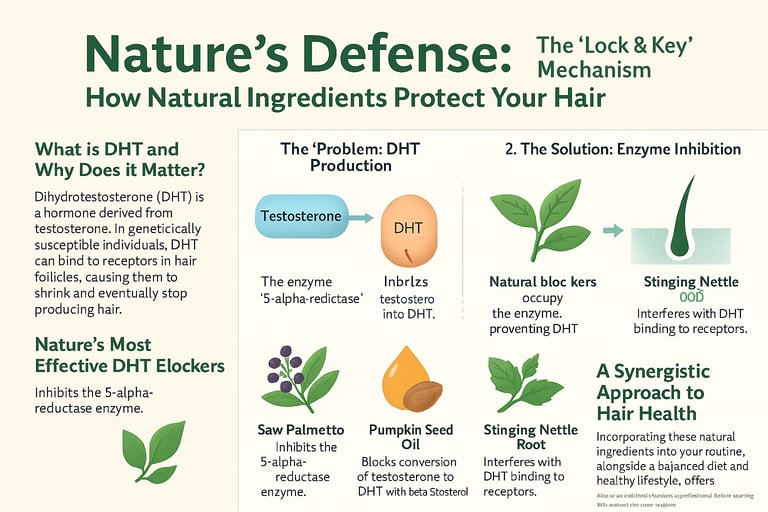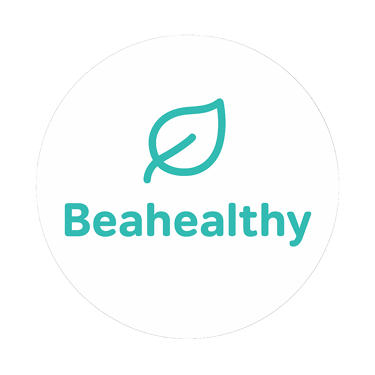Are You Missing A Look ? Do You Notice A Natural DHT Blockers for Hair Loss That Really Work
Struggling with hair loss? Discover the science behind natural DHT blockers and what truly works. Explore effective, evidence-backed natural dht blockers to combat hair loss thinning and boost your confidence. Learn more!
8/24/20257 min read


Its Yours Right To Be Look Beautiful
While you are looking beautiful in a mirror and suddenly splash in your mind some thing is missing there before thinking alot for what.Give a thought for others, the mirror image of thinning hair or a receding hairline is more than a matter of vanity; it's a silent erosion of confidence, a perpetual reminder of something slipping away. If you've found yourself standing in front of the mirror, searching for the hair you once had, don't panic, you are not alone. Millions of individuals suffer from hair loss, and most often, the culprit is an internal enemy: dihydrotestosterone, or DHT.
But suppose nature held the secret to combating this universal foe? For those who want alternatives not of the pharmaceutical ilk, the quest for natural DHT blockers against baldness has been a beacon shining brightly with hope. It is not a matter of passing fancies or wistful fantasy; it is looking into the science of how some plant kingdoms could potentially have the capacity to stem, even reverse, the tide of balding. We'll explore the mechanisms, look at the evidence, and expose what actually works to rebuild your hair and your self-confidence.
This Blogs Covers
DHT (Dihydrotestosterone) is a testosterone hormone that is primarily causative of androgenetic alopecia (pattern baldness) due to inducing hair follicle shrinkage.
Natural DHT blockers act by inhibiting action of the 5 alpha reductase enzyme, which converts testosterone into DHT, or by inhibiting DHT from binding to hair follicle receptors.
Evidence based natural remedies like Saw Palmetto, Pumpkin Seed Oil, and Rosemary Oil have all shown to be promising in clinical studies in stimulating hair growth and reducing hair loss.
Application of these remedies involves patience, perseverance, and at times a holistic approach with diet and lifestyle change for optimum benefit.
The Silent Culprit: Understanding DHT and Hair Loss
Imagine a tiny, invisible saboteur that strikes your hair follicles and gradually causes them to shrink until they cannot grow healthy hairs. That is more or less what DHT does in androgenetic alopecia, also known as male or female pattern baldness. But how does this hormone, which has other crucial roles to play in our bodies, turn into a hair villain?
What is DHT and How Does It Affect Hair?
DHT is an androgen, a male hormone, derived from testosterone. While testosterone is needed for muscle bulk and sex drive, DHT is stronger. In genetically predisposed individuals, hair follicles become more sensitive to DHT. When DHT binds to receptors on these follicles, a process of miniaturization ensues. As they get older, these follicles shrink and produce successively finer, shorter, and softer hair until they ultimately stop growing hair altogether. This explains the typical pattern of hair loss receding hairlines, balding crowns that is observed in millions of individuals worldwide.
The Role of the 5 Alpha Reductase Enzyme
Conversion of testosterone to DHT is not a spontaneous process but is catalyzed by an enzyme called 5 alpha reductase. Let us think of this enzyme as the catalyst, the switch that converts testosterone to its more potent form. Two versions of this enzyme exist: Type 1, found in skin and sebaceous glands, and Type 2, mostly in the prostate gland, seminal vesicles, and most relevantly, hair follicles. Medications like finasteride block this enzyme and reduce DHT levels. Natural DHT blockers tend to try to get the same result, but in a different way and sometimes with less side effects.
Unlocking Nature's Pharmacy: Proven Natural DHT Blockers
The good news is that Mother Nature has an arsenal of compounds that can help potentially in the fight against DHT. They are no silver bullets, but scientifically-backed co-fighters that can be a source of hope for those seeking options from nature.
Saw Palmetto: The Herbal Heavyweight
One of the most universally accepted natural DHT inhibitors, saw palmetto (Serenoa repens) is a short palm tree native to the southeastern United States. Fatty acids and plant sterols in its berries are believed to inhibit the 5 alpha reductase enzyme. Research has tested its efficacy:
A systematic review of Journal of Alternative and Complementary Medicine articles found saw palmetto to be promising for increasing hair growth in those with androgenetic alopecia, with good results noted in up to 60% of subjects in some studies. (Rossi, 2012)
Pumpkin Seed Oil: More Than Just a Snack
Underestimated far too frequently, pumpkin seed oil (Cucurbita pepo) is quickly emerging as a key ingredient in natural hair loss solutions. It's chock full of zinc, magnesium, and phytosterols thought to interfere with testosterone being converted to DHT. The facts are compelling:
A double blind, placebo controlled, randomized trial in Evidence Based Complementary and Alternative Medicine revealed exceptional results.
Daily consumption of pumpkin seed oil by men resulted in a 40% increase in hair after 24 weeks, a dramatic contrast to the 10% increase by the placebo group. (Cho et al., 2014)
Rosemary Oil: An Aromatic Solution
Apart from its culinary uses, rosemary oil (Rosmarinus officinalis) is also widely used as a topical treatment for baldness. It is believed to improve blood flow to the scalp and, more significantly, have compounds that can block DHT. Its closeness to an extremely popular drug is particularly intriguing:
A 2015 study in Skinmed directly compared rosemary oil with minoxidil 2% (a usual baldness therapy) for androgenetic alopecia for six months. Both groups experienced statistically significant hair increase, with no differential efficacy between them. This suggests that rosemary oil is as effective as minoxidil, and possibly with fewer side effects. (Panahi et al., 2015)
Green Tea: Antioxidant Powerhouse
Green tea (Camellia sinensis) is well known for its antioxidant properties, which are mostly due to the high concentration of epigallocatechin 3 gallate (EGCG). Research shows EGCG has the potential to inhibit the 5 alpha reductase enzyme, which slows DHT production. Although more human trials on hair loss are required, laboratory studies show a promising sign.
In vitro testing, such as a study in Archives of Dermatological Research, has shown EGCG to suppress 5-alpha-reductase activity within human dermal papilla cells, the very cells that produce hair growth. (Kwon et al., 2007)
Stinging Nettle Root & Pygeum Bark: The Unsung Heroes
Stinging nettle root (Urtica dioica) and Pygeum bark (Prunus africana) are typically used together in herbal supplements aimed at prostate health, for benign prostatic hyperplasia (BPH), a condition also related to DHT. Scientific research, including studies of their 5 alpha reductase inhibiting action, show that they may have DHT blocking activity and thus are potential complementary parts of a treatment regimen for hair loss.
The 5 alpha reductase inhibitory activity of Urtica dioica root extracts and Pygeum africanum was studied in Planta Medica and the researchers discovered that the two exhibited inhibitory activity, proving their application in traditional herbal medicine to cure DHT induced conditions. (Hiipala et al., 1998)
Adding Natural Solutions to Your Life
Taking natural DHT blockers is not a one shot deal; it's an ongoing commitment to a multifaceted regimen. How do you incorporate these potent botanicals into your life in a way that maximizes their effectiveness?
Outside of Supplements: Lifestyle and Nutrition
While supplements and topical oils are essential, hair health only really thrives within the confines of a balanced universe. Consider these supporting strategies:
Nutrient Rich Diet: Ensure your diet is rich in vitamins and minerals important for hair growth, such as biotin, zinc, iron, and Vitamins A, C, D, and E. Leafy greens, berries, nuts, and lean proteins are essential.
Stress Relief: Chronic stress will exacerbate hair loss. Meditation, yoga, or even simply getting a good night's sleep may be beneficial.
Gentle Hair Care: Avoid extreme chemicals, overusing heat styling tools, and tight hairstyles that can cause undue tension to your follicles.
Regular Exercise: Increased blood flow from exercising can enhance scalp health, delivering nutrients to hair follicles more efficiently.
Setting Realistic Expectations
Natural remedies, although effective, generally take time. In contrast to some medications, which may provide immediate results (albeit sometimes at the cost of side effects), natural blockers harmonize with your body in the long term. Be prepared to make a commitment of at least 3-6 months before noticing marked changes. Consistency is key. Monitoring your progress through photography can prove highly motivating.
Your Action Plan
Up for taking charge of hair loss? Here is a straightforward plan:
Consult a Professional: Talk to a dermatologist or medical doctor first about your hair loss to rule out hidden medical reasons for losing your hair before starting any new hair loss regimen.
Choose Your Natural Allies: According to the evidence, consider adding Saw Palmetto (oral supplement), Pumpkin Seed Oil (oral supplement), and/or Rosemary Oil (topical application) to your practice.
Consistency Is Essential: Whether it's a daily supplement or a nightly rosemary oil scalp massage, consistency is key to realizing results.
Embrace a Balanced Lifestyle: Balance your natural blockers with good nutrition, stress-reduction methods, and gentle hair treatments.
Monitor and Adjust: Watch your progress. If within a couple of months you're not achieving what you intended, return to your professional and talk over other options or how to change your current approach.
A Product We Trust
Understandably, knowing the potential of such natural substances, reassuring is the fact that there exist products that can capitalize on them. For someone seeking an holistic, evidence-based remedy for natural hair care, TruVarin stands out as a serious contender. In an amalgamation of the primary natural ingredients, with those well known for their capacity to block DHT, TruVarin offers an effortless way of infusing such potent ingredients into your hair care regimen.
We highly recommend you give TruVarin a try and discover how it can contribute to your journey to healthier, fuller hair.
Parting Words
It is daunting to think about the journey to battle baldness, but the advancement in understanding DHT and the body of evidence in favor of natural therapy leaves us with genuine hope. By educating yourself on natural DHT blockers for baldness and following with a steady, overall plan, you're not just fighting a losing war; you're actually making an investment in the wellbeing and health of your hair. Remember that although the process is long and it takes persistence, having the potential to regain your confidence and fuller hair is a strong motivation. Your hair's fate, quite literally, is in your hands.


Health and Wellness
Your trusted source for health and fitness.
Connect
contact: beahealth.it@gmail.com
© 2025. All rights reserved.
